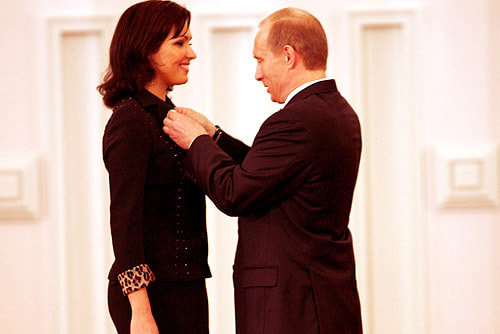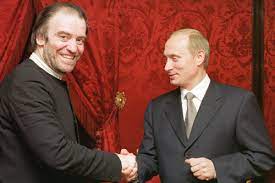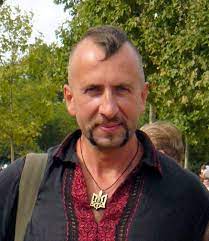The Singer's Spirit
Menu
|
By Lisa Houston Elisabeth Schwarzkopf, one of the greatest singers of the twentieth century, was a Nazi. Should I have said differently? Just, “she was a Nazi?” Or maybe just, “she was a great singer?” Does it matter that her motive was probably intense ambition rather than a particular hatred of Jews? Does it matter that for her whole life, even after 1981 when facts began to come to light, she lied, avoided the topic, and issued denials? These are good questions, and after Russia’s recent invasion of Ukraine, singers, opera lovers, and opera journalists are revisiting them. Two great Russian artists, Conductor Valery Gergiev and soprano Anna Netrebko, have both been strong Putin supporters for many decades. Now, after careers full of stunning achievement, they are about to experience something new: failure. They simply will not or cannot seem to find the words needed to assuage the broader operatic community. Gergiev has been fired and the Munich Philharmonic for refusing to denounce the war, and engagements with other companies have been cancelled. His agent fired him. Netrebko, who eventually published an anti-war post without denouncing Putin, has cancelled her upcoming performances, before others had a chance to do it for her.  Opinions vary. The Süddeutsche Zeitung (Munich’s largest newspaper) had an opinion piece denouncing Gergiev's firing, calling it a “trauriger Akt”, a sad act. An angry post of Netrebko's (which she later deleted) complained that people in the West, safe in their homes, have no right to judge those living in other countries. (She’s not entirely wrong. One only had to watch the figure skating in the winter Olympics to see what kind of pressure can be brought to bear on a performer under Russia’s current regime. Although Netrebko herself is an Austrian citizen.) Still, the rant was off-brand for the singer and was deleted, and at the time of this writing her Instagram account has been made private. The backlash for both has been severe, and may be just beginning. Meanwhile, singers from other eastern European countries, such as mezzo-soprano Elina Garanča from Latvia, and tenor Piotr Becszala from Poland, both mega-stars, have absolutely denounced the war and cut ties with Russian organizations. For those of you who think that in the face of global events the action or inaction of a few musicians doesn't matter, I respectfully disagree. Regimes like Putin's do not succeed in a vacuum. Traditionally, vile dictators must be bathed in glory. It distracts people from their atrocities. Look at the shiny object over here! Pretty! Netrebko and Gergiev, as great artists and glamorous figures, have been two of Putin’s greatest enablers. Both have stood by Putin at key strategic moments, most notably in 2014 when Russian separatists took over Crimea. Back then, despite a few protests against Gergiev, opera companies and producers let it slide. But opera has grown up a bit since then. In the wake of BLACK LIVES MATTER, companies have begun to face the fact that with all white board members, almost all male management and musical direction, they are not as a-political as they thought. In recent years, opera companies have added repertoire by diverse composers. There have been staff changes. Some companies have added new departments as San Francisco Opera did with its “Department of Equity, Diversity, and Community.” In the aftermath of the invasion of Ukraine, companies are responding. Time will tell which statements manifest as meaningful actions. And as always, silence is its own response. There have been cast changes, cancelled performances, and promises for the future. The Deutsche Oper in Berlin, and many others, have posted the Ukrainian Flag on their websites. At a performance of Wagner in Madrid, the coffin of Siegfried was draped in a Ukrainian flag. Peter Gelb of the Met made a strong statement, while others, I won’t name names, you know who you are, have said so little they wouldn’t have exceeded the old twitter’s character count. It makes me wonder about the behind the scenes discussions going on, when at the best of times, not to mention Covid times, opera companies are juggling catastrophes. For many decades in the mid twentieth century, my grandfather, James Brosnahan was the business manager of the Boston Symphony Orchestra. Back then, perhaps as now, it was a catchall job. Somewhere in the family archives is a picture of Grandpa standing in front of Symphony Hall on Massachusetts Avenue. A huge truck has crashed into the front of the building. That’s the kind of thing opera and orchestra managers have to deal with. The unexpected disaster of the day. I didn’t really know my grandfather, and you can’t tell in the photo what he is thinking about this huge truck smashed into the building. But I have a feeling there are a few opera managers today who know how exactly how he feels.  For an individual musician, on the other hand, there are a thousand disasters you could confront every day, and don’t. On one level, how can anyone go around singing arias while people are starving? While malaria is killing millions? While (fill in the blank with your own most disturbing current event.) But when you are a musician, you must learn to put things aside, and focus on your art. In a sense, you build a wall. You close the practice room door. As one technique advises, you keep a piece of paper and pencil on the piano, and when you think of that essential thing that absolutely has to be done, you write it down, to do it later. It’s a “Not Now” list. Now is for practicing. And frankly, the more successful you are, the better you are at keeping that artistic space sacrosanct. So, one can empathize with artists like Netrebko, who lurch and falter, and fail to act when the time comes. They’re good at looking away from the human capacity for brutality and focusing on the human capacity for beauty. That’s what it means to be a musician. That’s the choice you make. Sometimes they’re not so good at turning around to look the other way. Even so, Netrebko’s “I’m an artist, not a politician” line has worn thin. It sounds as if she sees herself as Tosca in Act II, saying “I lived only for art, why, oh why, has God abandoned me this way?” A contemporary of Schwarzkopf, the great German bass Hans Hotter never joined the Nazi party. He stayed in Germany throughout the war, singing, though he refused to sing at Bayreuth in 1940 in protest. On one of his famous Lieder recordings you can hear bombs going off in the background. Though it must also be noted that things were doubtless different for a beautiful young woman, especially around the notoriously lecherous Goebbels, who was the head of the opera company in Charlottenburg at the time Schwarzkopf’s career began. Composer Richard Strauss and conductor Wilhelm Furtwängler also never joined the party. Nor did Viennese conductor Karl Böhm. But in 2015 the Salzburg Festival added a plaque to the concert hall named for Böhm which states, in part, that Böhm “was a beneficiary of the Third Reich and used its system to advance his career.” And that is where music lovers tend to fall. In our own version of “hate the sin, love the sinner,” we hate the sin, and love the singer. Let us not forget Callas, the one and only. Callas collaborated with the occupation in Greece during the second world war. Both she and her mother took the protection of Italian officers. But these facts stand alongside the music. They cannot erase it. (For what it’s worth, I thought Netrebko's Traviata was sublime. Gerviev's conducting of Berlioz Les Troyens at Carnegie Hall was as great a performance of classical music as I have ever attended.) Meanwhile, as horrible as the images coming out of Ukraine are, I know we are not seeing the worst of it. War reports, tend to show the refugees. But every society has people too weak or disenfranchised to even attempt to flee. The elderly. People in hospitals. Or people who refuse to leave their animals behind. (Would you?) It is terror of the utmost kind. Unimaginable horrors of war. As an animal lover, I know the kind of people who run animal shelters, and they’re not going to leave those animals. Even now, as reports come from shelters in Ukraine that the food supply is running out, they will stay. Those who helped give Putin a respectable sheen, do not have the same duty as all of us to speak up. They have a special duty to speak up, to undo some of the damage that they themselves have brought about by celebrating him. Netrebko and Gergiev have benefited for decades from the status, funding, and lavish praise of Putin himself and his regime. As the San Francisco Chronicle’s Joshua Kosman put it with regard to Gergiev, “now that bill has come due.” Kosman Article Additionally, I’m not in a hurry to be overly praising of those who cut ties with Gergiev and Netrebko now. The opera world is agist, and always in search of a money-making celebrity. Would these companies have been so quick to cut ties if it were a fifty-six-year-old conductor and a thirty-eight-year-old singer as they have been with a sixty-eight-year-old conductor and a fifty-year-old singer? We don’t need to guess about this. Remember 2014. Nobody fired them then. They were at their peaks. Excuse me, my cynicism is showing. There is another dynamic on display here. For some singers, there is a crazy level of ambition, which Schwarzkopf doubtless had, a fervor which often includes an almost slavish devotion to the conductor. Even when she finally eked out an anti-war post, Netrebko posted it alongside a picture of her with her beloved and recently fired colleague, Gergiev. How can you explain this devotion to someone who is not a singer? Perhaps the best way is to tell a joke that singers tell. It’s somewhat horrific, but that’s the point, so here goes. A singer returns home to find that her house has been burned to the ground, in the version I was told, with her cat inside. She stands on the street looking at her destroyed home. A neighbor comes over to talk to her, and explains that the culprit was the conductor. “He came and burned the place to the ground,” the neighbor says. At this the singer beams and blushes, responding, “the conductor came to my house?!” Netrebko’s post with Gergiev may embody this cliché in the extreme. But for all of us singers, it's a value system we can fall into, and one we'd do well to revise, if not abandon. So, what is it fair to expect from an artist, as these events play out in real time? I don't know. But at the very least, we might hope our artists would cease to use art as a shield. As pianist Igor Levit said in a recent twitter “duet” with Netrebko, “never bring up music or your being a musician as an excuse. Do not insult art.” (Here is a link to my previous interview with Levit. Igor Levit Interview ) Singers are human, and make all kinds of choices, good and bad. If history is any indication, those choices will be remembered.  Vasyl Slipak Vasyl Slipak I will give the last word to a singer. His name was Vasyl Slipak. Born in 1974 in Lviv, Ukraine, he sang from childhood, eventually studying at the conservatory, and winning honors for his rich basso voice. He embarked on a successful career at the Opera Bastille in Paris. In 2014, when Russia began what is now known as the War in Donbass, he left his operatic career and went home to fight for his country’s sovereignty. Early in the morning of June 29th, 2016, at the age of forty-one, Vasyl Slipak was killed by a Russian sniper. In 2017 he was posthumously awarded the title “Hero of Ukraine.” Link below: Vasyl Slipak sings the Torreador Song from Carmen.
0 Comments
Leave a Reply. |
|
©Lisa Houston 2022
